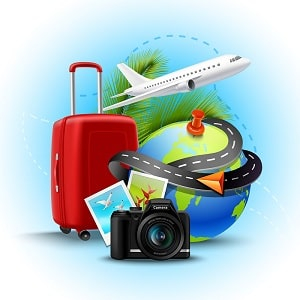Traveling can be an exciting and rewarding experience, but when you’re dealing with nausea, it can quickly become a nightmare.
Motion sickness, food poisoning, or simply stress from being in an unfamiliar environment are common causes of nausea.
Whatever the cause, it can have a drastic impact on your travels and make getting to your destination more difficult than expected.
Fortunately, there are some tips and tricks that you can use to help manage your nausea while traveling so that you can enjoy your trip without feeling sick all the time.
Understanding Nausea
 First things first, it’s important to understand what nausea is and what triggers it.
First things first, it’s important to understand what nausea is and what triggers it.
Nausea is the feeling of being sick or uncomfortable in your stomach and can be caused by motion sickness, food poisoning, or stress from traveling.
Common symptoms include dizziness, sweating, headaches, lightheadedness, and even vomiting.
Knowing the possible triggers for your nausea can help you prepare better for travel and make sure you don’t end up feeling sick.
If you find yourself sick with nausea, here are a few tips to keep in mind.
#1. Stay Hydrated
Dehydration can worsen nausea and make it hard for you to stay in control of your body’s reactions, so it’s important that you keep yourself well-hydrated at all times.
Drink plenty of water throughout the day, especially when traveling on planes or buses, as these are two locations where dehydration is more common.
#2. Focus on Your Breathing
Controlled breathing can help reduce feelings of nausea by calming your mind and body.
Try to take deep, slow breaths while focusing on a point in front of you to help manage any sudden waves of nausea that may come over you during travel.
#3. Avoid Heavy Meals Before Traveling
Eating heavy meals right before traveling can increase the chances that you will experience motion sickness or feel nauseous due to indigestion, so try to avoid eating anything too heavy just before leaving for your destination.
If possible, have light snacks such as crackers instead, which won’t fill up your stomach but will still provide some energy throughout the journey ahead.
#4. Take Medications if Necessary
If necessary, consider taking medications such as anti-nausea tablets or ginger capsules, which are known for their ability to reduce nausea symptoms.
Always check with your doctor before taking any medications, particularly if you’re pregnant or have allergies.
For those not interested in medicine, a natural alternative like cannabis can be right for you. Check with Marijuana Doctors for more information.
#5. Recline and Relax
If you’re experiencing waves of nausea while on a plane or bus, then try to recline your seat as much as possible and relax, which can help reduce the feelings of nausea.
If possible, ask for an aisle seat, as this will give you more space to adjust your body and move around if necessary.
#6. Wear Comfortable Clothes
Wearing uncomfortable clothes can make motion sickness worse, so try to wear loose-fitting clothing that won’t restrict your movements or irritate your skin.
If you’re traveling on a hot day, then try to wear breathable materials such as cotton, which will help keep your body temperature down and reduce the chances of nausea.
#7. Get Enough Sleep
Traveling can be tiring, especially if you’re crossing time zones, so make sure that you get enough rest and sleep so that your body can recover from the journey.
Not getting enough rest can make you more susceptible to nausea due to fatigue.
#8. Limit Stimuli
Noise, bright lights, and strong smells can all increase feelings of nausea, so try to limit your exposure to these stimuli as much as possible.
If you’re on a bus or train, then bring noise-canceling headphones or an eye mask to help reduce the chances of feeling nauseous from external stimuli.
#9. Distract Yourself
When you’re feeling nauseous, you can try to focus on something else, such as listening to music or a podcast, reading a book, or playing a game on your phone.
Doing this can help take your mind off nausea and make the journey more enjoyable.
Conclusion
Traveling with nausea can be a difficult experience, but following the tips and tricks mentioned above will hopefully make it easier for you to get to your destination without feeling sick all the time.
Always make sure that you look after your health, and if nausea persists for more than a few days, then consider consulting with a doctor to get the right medication or treatment.
With some preparation and self-care, you can have a smooth journey and enjoy your time away from home!
More Great Content
More Great Content
- 6 Best Ways To Plan Kerala Trip within Budget
- Best Places To Visit in Hong Kong, Sightseeing & Tourist Attractions
- The Most Useful Outdoor Survival Tips





